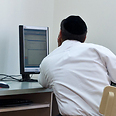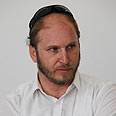


A recent study conducted by the Industry, Trade and Labor Ministry predicted that Israel will see a 6% drop in its workforce within 20 years, especially due to the growing ultra-Orthodox and Arab population shares. But activists in the religious sector dismiss the forecast, noting the growing rates of employed haredim.
"I don't see the pessimistic predictions coming true," said attorney Yoav Laloum, chairman of the Noar KaHalacha, an organization that advocates against discrimination in the haredi sector.
"The Industry, Trade and Labor Ministry must increase employment opportunities for haredim instead of hiding behind gloomy statistics, which help all those ultra-Orthodox elements who do everything possible to block the welcome developments in the sector."
Laloum added that he expects continued growth in the numbers of ultra-religious individuals who get a higher education.
According to Ariel Deri, the director of the Haredi College of Jerusalem, a sharp rise in the number of haredim who entered the workforce registered over the past five years.
"This trend is affected, first and foremost, by the placement system that allows the haredim to integrate in the workplace without compromising their lifestyle and world view," he said. "If the government, public agencies and education institutions maintain this trend, it would certainly increase the percentage of haredi employees in the workforce.
"We must remember that these kinds of processes raise many concerns, which is why much caution and forethought are required," he added. "Today we can already see a second generation of haredim who are integrating, whose kids go to quality schools from the start. All that's left for the government is to show openness toward the population's unique characteristics, and allow the group to take the necessary steps, at its own place. This will certainly make the forecasts much more positive."
'Haredim feel national responsibility'
Attorney Yechezkel Rosenblum of the Tov movement, which represents working haredim, said that the growing rates of employment in the sector deems the Industry, Trade and Labor Ministry's study irrelevant.
Rosenblum noted that a growing number ultra-Orthodox individuals in their early 20s are getting jobs these days, and that it's becoming increasingly legitimate for yeshiva students "who don't really study" to go to work.
Among women, he added, the employment rates match those of the rest of the population.
"More and more haredim feel a national responsibility," he said. "(…) In my opinion, the future is 'black' – not in the pessimistic sense, but in the sense of the haredi contribution to society," Rosenblum said.
- Receive Ynetnews updates
directly to your desktop















